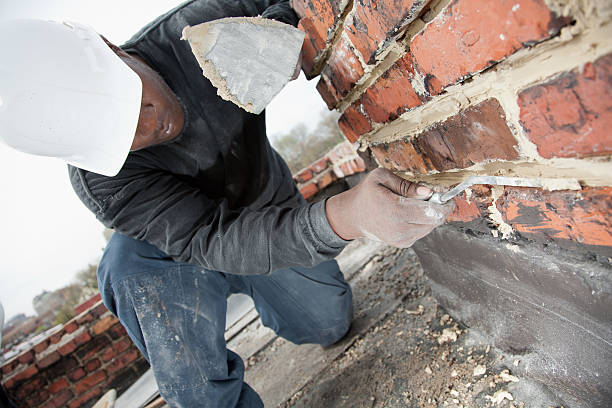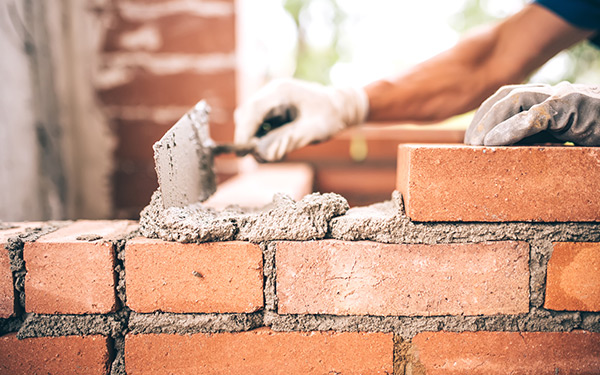Unlocking the Tricks of Sustainable Masonry Building And Construction Practices for Eco-Friendly Buildings
Amongst the myriad approaches to environment-friendly structure, sustainable stonework building stands out as a reliable and long lasting technique that holds a wealth of untapped possibility. From the choice of products to innovative building and construction techniques, the keys to accomplishing sustainability within stonework construction are diverse and fascinating.
Advantages of Lasting Stonework Building And Construction
Welcoming sustainable masonry construction methods not just decreases environmental impact but likewise uses lasting financial benefits to builders and areas. By using materials like recycled bricks, blocks, and rocks, building contractors can dramatically reduce the carbon footprint of their tasks while promoting resource efficiency. Furthermore, sustainable stonework building and construction methods, such as appropriate insulation and thermal mass properties, can enhance power effectiveness within buildings, leading to reduced functional expenses in time.
Moreover, the longevity and resilience of stonework structures contribute to long-lasting economic advantages. Structures built utilizing sustainable masonry practices often require much less repair and maintenance, converting to cost savings for building contractors and homeowner. The durability of masonry products also makes certain that structures stay secure and protected, minimizing the demand for frequent improvements or replacements.
Eco-Friendly Stonework Materials
Using environmentally friendly masonry materials is a crucial step towards enhancing the sustainability of construction practices and lessening ecological influence while maximizing long-lasting financial advantages. Lasting stonework products are sourced, generated, and utilized in a manner that decreases total ecological impact. Materials such as recycled bricks, recovered rock, and lasting concrete blocks are coming to be increasingly prominent selections for eco-conscious contractors. Recycled blocks, for instance, not just draw away waste from landfills however additionally require less energy to produce contrasted to new blocks. Recovered rock supplies a distinct visual charm while lowering the need for brand-new quarrying. Lasting concrete blocks integrate recycled accumulations and may feature better insulation properties, adding to power effectiveness in buildings.
In addition, all-natural products like adobe, rammed planet, and straw bundles supply excellent thermal mass buildings, reducing the requirement for home heating and cooling down power. These products are usually locally readily available, promoting regional economic climates and decreasing transportation-related carbon emissions. By choosing environmentally friendly masonry products, building projects can dramatically lower their ecological footprint and add to the creation of healthier, more lasting developed settings.
Energy-Efficient Stonework Methods
Energy efficiency plays a vital role in enhancing the sustainability of masonry building practices. By implementing energy-efficient stonework techniques, builders can substantially minimize the general energy usage of a structure, bring about lower operational prices and a smaller environmental footprint. One crucial energy-efficient stonework technique is the usage of thermal mass, which includes incorporating dense materials like concrete or block right into the building's framework to soak up and save heat. This helps regulate interior temperatures, reducing the need for mechanical heating great site and cooling down systems.

Advancements in Lasting Masonry
Recent innovations in sustainable stonework methods have actually brought about innovative strategies that are reshaping the building and construction sector. One such innovation is the growth of self-healing concrete, which makes use of microorganisms embedded within the concrete to heal fractures autonomously. This innovation not only decreases upkeep prices however also improves the toughness of stonework frameworks, adding to their sustainability.
An additional noteworthy innovation is making use of recycled accumulations in stonework construction - masonry contractor. By including products such as smashed ceramic waste or recycled glass right into concrete mixes, builders can lower the ecological effect of building and construction projects while keeping structural honesty. This practice not only diverts waste from garbage dumps yet likewise preserves all-natural sources, making it an essential innovation in sustainable masonry building and construction
Moreover, the combination of electronic design tools, such as Building Details Modeling (BIM), is reinventing the way stonework frameworks are intended and created. BIM enables even more specific computations, reduced product waste, and improved power effectiveness, inevitably causing more lasting building techniques. These innovations jointly represent an appealing future for Resources lasting masonry construction in the period of environmentally friendly buildings.
Future Trends in Masonry Sustainability
With the cutting-edge strides made in lasting stonework practices, the future fads in masonry sustainability are poised to additional change the construction sector. One of the crucial fads forming the future of masonry sustainability is the raised integration of innovation. Innovations such as Structure Information Modeling (BIM) and virtual fact simulations are being utilized to maximize stonework building procedures, resulting in lowered material waste and boosted energy performance in buildings.
Furthermore, the growth of novel sustainable materials is established to play a substantial function in boosting the eco-friendliness of stonework construction. masonry contractor. Developments like self-healing concrete, recycled aggregates, and bio-based binders are obtaining traction for their capacity to reduce environmental impact while keeping structural stability

Verdict
Finally, sustainable masonry construction techniques offer many advantages for eco-friendly buildings. By making use of eco-friendly materials and energy-efficient strategies, stonework can add to a much more lasting built environment. Advancements in sustainable stonework are continually being created to further boost the ecological efficiency of buildings. Looking in the direction of the future, the fad of stonework sustainability is expected to grow, resulting in even more ecologically pleasant and energy-efficient construction practices in the years to come.